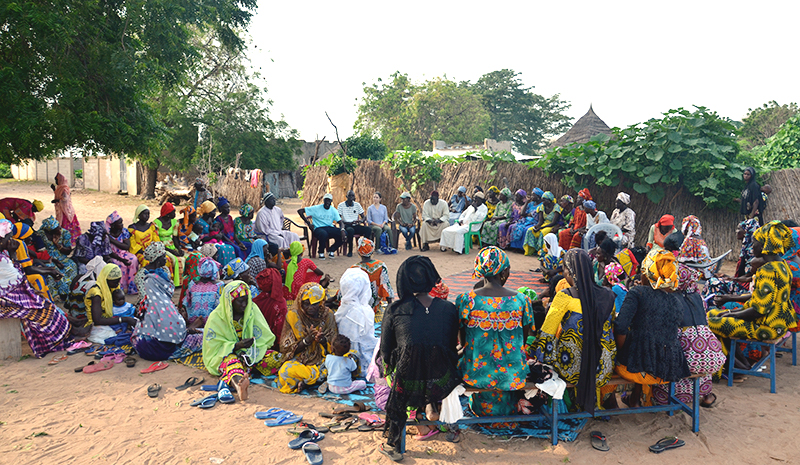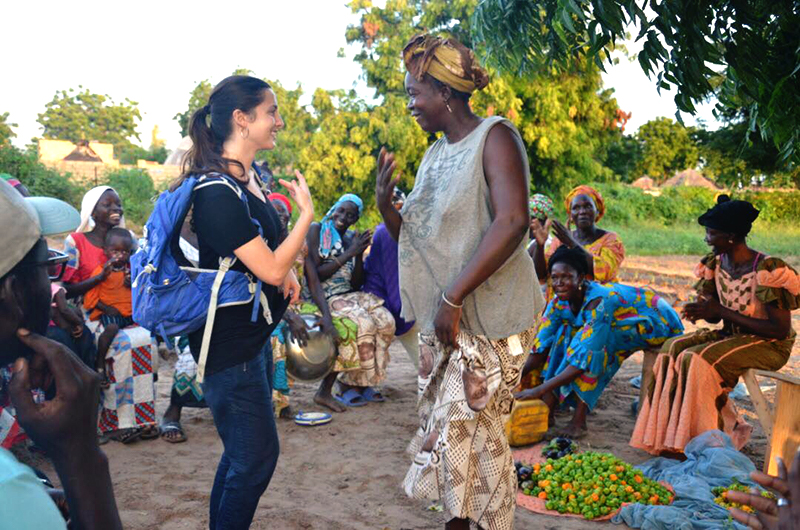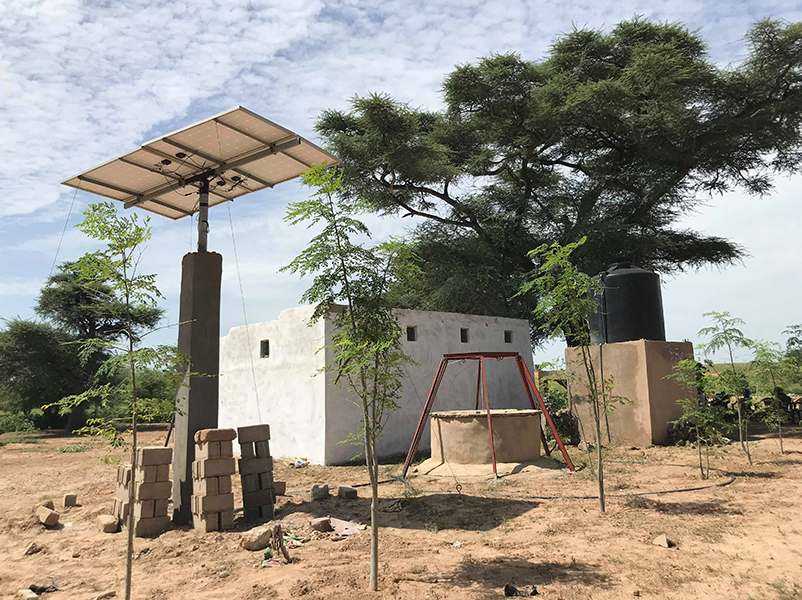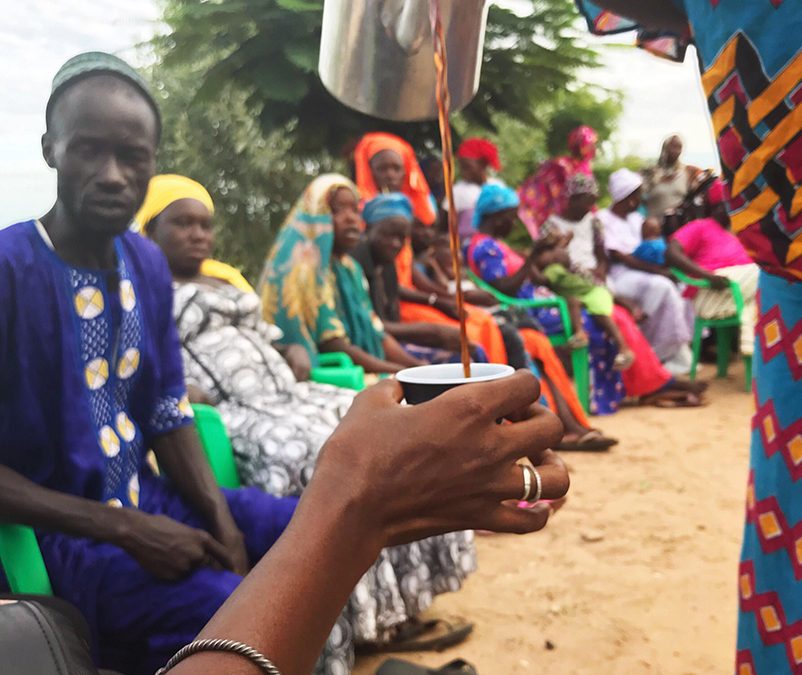Pictured Above: Fatou Thiam, CREATE! Communications Coordinator, enjoys a cup of Cafe Touba as the team stops for a break to meet with community members in Back Samba Dior.
Recently, CREATE!’s team hosted our U.S. Communications Coordinator, Natalie, in Senegal. Here, Natalie offers a glimpse into her enriching experience:
The vast, hazy blue sky stretches over arid land scattered with acacia and baobab trees offering little shade, withered by Harmattan winds. Temperatures hover at 100 degrees Fahrenheit during the dry season, prompting cattle and goat herders to migrate south in search of better grazing land as the desert encroaches year after year. In the quiet, rural town of Gossas, trails of aromatic cooking smoke drift toward the sky outside of homes and local shops. People smile and greet one another, “As-Salaam-Alaikum.” Welcome to Senegal.
Cups of Café Touba
Over the course of a week, I visited 13 of CREATE!’s partner communities in the Kaolack, Fatick, and Louga Regions of Senegal. These ranged from graduated villages to communities that were just starting their first projects. In every community, I was greeted with friendly smiles, handshakes, a multitude of questions, and a small cup of Café Touba, a type of coffee named after the holy city of Touba.
One of the most profound moments of my visit was listening to Omar Ndiaye Seck, CREATE!‘s Country Director, speak at each village. He emphasized CREATE!’S participatory approach – these communities are the architects of their own destinies, and CREATE! merely equips them with the tools and knowledge to thrive for generations to come. As said in Wolof, one of Senegal’s most widely spoken languages: xamxam dafay weey, xaalis dày jeex; knowledge remains, while money gets used up. In other words, you can’t take away knowledge.
Cups of café Touba were shared amongst community members and CREATE! staff as we collectively envisioned the future of these projects. While savoring my sweet and spiced drink, I had the privilege of listening to stories from remarkable people. My mission was to understand their hardships and aspirations without imposing my own beliefs or emotions on their narratives. I aimed to convey the authenticity of CREATE!’s work while preserving the dignity of those overcoming challenges.

CREATE!’s field team meets with community members in Mbossedji.
Learning in Mboss: Meeting Nogaye Faye
One compelling story came from Nogaye Faye in the community of Mboss. She revealed that the Gossas market, located five kilometers away, was her sole source of fresh produce for her family. However, the journey was costly, both in terms of time and money, making it difficult to meet her family’s needs. In response, Faye and other women in Mboss took matters into their own hands, establishing an organic community garden using the techniques taught by CREATE!’s technicians. Faye described her transformation, stating, “Before, I stayed at home without an occupation. Now, we are training with the technicians, and I visit the site every day. As a result, my children eat fresh vegetables and become healthier because our production is very natural.” The Mboss garden’s success inspired Faye and her fellow community members to return to the Gossas market as vendors, selling their surplus produce.
Visiting Mboss and witnessing the thriving garden in person was an honor. The land had endured years of monoculture and desertification, stripping it of nutrients. As I held the dry ground in my hands, letting the dry grains slip through my fingers, it struck me that many of these communities were cultivating crops not in soil, but in sand. This was made possible through the utilization of solar technology for water access and the adoption of organic farming techniques.
Our garden tour concluded as the evening’s cooling temperatures set in, with many of the women choosing to linger in the garden, socializing. As the music began to play, Faye graciously invited me to join in the dance.

Natalie and Faye dance together in Mboss.
Listening to Local Leaders: The Importance of Paving the Way for the Next Generation
Miles away from the nearest town, located at the end of a sand-covered road is the community of Wereyane. The heat from the dry season slows down activities, and many women will rest before resuming their work in the cool evening air. In the shade of young papaya trees, I had the privilege of conversing with Arame Diop, the Garden Cooperative President, while enjoying refreshing fruit drinks.
Arame shared her aspirations for the community, and her goal for children to sustain themselves within the village, just as her generation does today. Her mission is to pass on the knowledge she gains from CREATE! to the next generation, ensuring they can continue to nurture both themselves and their environment. With this sustainability, she believes, they can further develop the infrastructure in Wereyane.
Arame also explained that the community gardens, in addition to bolstering food security and generating income, foster a profound sense of unity among the women. Previously, these women rarely spent time together unless there was a special occasion, but now, through the gardens, they collaborate, support, and inspire one another on a daily basis.

Wereyane’s solar-powered pumping system.
The journey introduced me to extraordinary women who are blazing a trail for the generations that follow, and I am deeply grateful for their willingness to share their stories, ambitions, challenges, and cups of Café Touba with me. I also want to thank the CREATE! team, whom I am constantly learning from, for so kindly welcoming me to Senegal. I am certainly coming home with a full heart.
Thank you, jerejef, merci.

